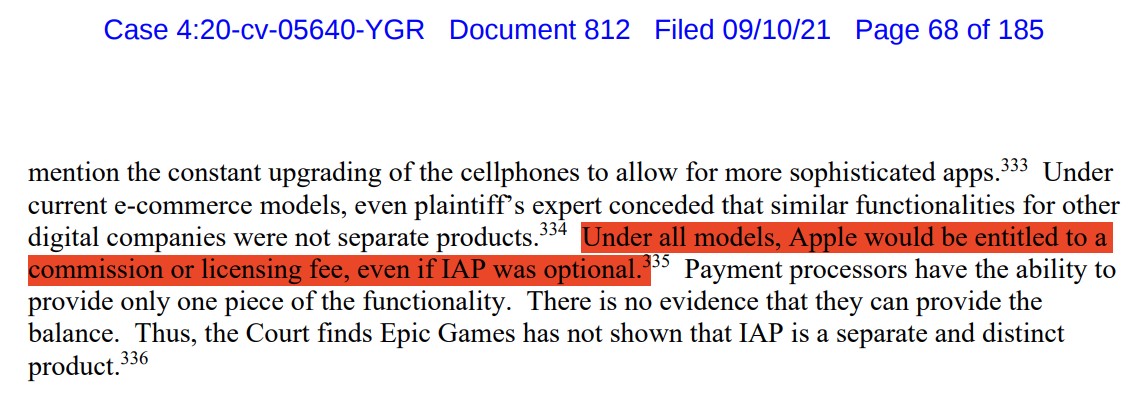Last week, this act of strategic legal trolling paid off when the lawsuit concluded and Judge Yvonne Gonzalez Rogers made a surprising and rare decision against Apple. The company would no longer be able to ban developers from using their own payment systems through iPhone apps; other “purchasing mechanisms” would be allowed, she wrote. In other words, when the ruling takes effect, in three months, Apple will no longer be fully in control of how users pay for things through iPhone apps.
...
The judge’s decision moves in the direction of openness—but not too far. Epic would have preferred to pay Apple no fee whatsoever, but Gonzalez Rogers held that Apple was justified in charging for the use of its App Store. Otherwise, it would suffer from “the uncompensated use of its intellectual property,” she wrote: Apple invested in the store infrastructure, so it should get paid for it. On the other hand, Apple’s “anti-steering” policy, which prohibited developers from informing their users of Apple’s fee, let alone avoiding it, was found to be illegal. Running a marketplace is fine, as is kicking out those who don’t comply with the rules, but clients of the marketplace can’t be trapped into only using Apple’s tools instead of their own.
Yet Epic lost as much in the ruling as it won. (The video-game company is now appealing the case.) Gonzalez Rogers determined that Apple’s App Store did not, as Epic had charged, constitute a monopoly—at least not at the moment. According to the decision, Apple controls fifty-five per cent of transactions in mobile gaming, and is “near the precipice of substantial market power.” What prevents it from monopolizing the industry is the significant competition posed by the likes of Nintendo and the cloud-gaming service Steam. While Apple and Google certainly have a duopoly on phone hardware in the United States, they are contending with a growing number of alternative digital marketplaces. Gonzalez Rogers estimated that the mobile-gaming market is worth a hundred billion dollars annually; Apple will now have a little bit less of a chokehold on it.
From a user-experience perspective, the ruling could have immediate benefits. Netflix, for instance, will be able to introduce a direct Subscribe button within its app, and offer a discount to encourage its use, as Epic did with V-Bucks. The changes may not be entirely convenient. App interfaces could become messier or less secure as developers introduce their own payment methods, sending users to Web-site pop-ups instead of frictionlessly applying the payment information saved within the App Store. Nevertheless, digital business models will be more sustainable as a result. If Gonzalez Rogers’s decision is any indication, the metaverse will not be monopolized.




